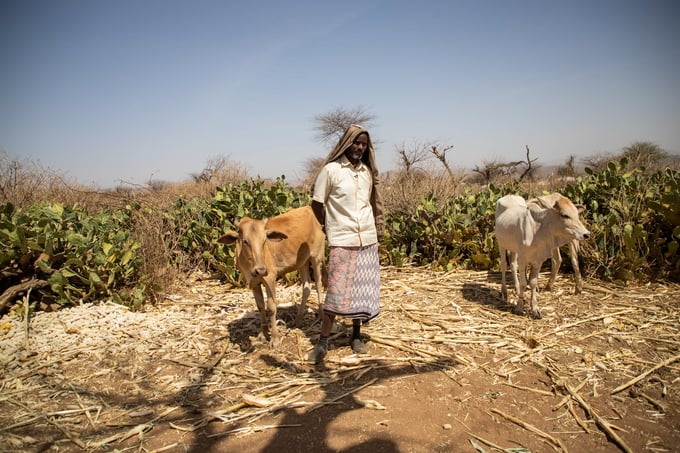May 28, 2025 | 14:25 GMT +7
May 28, 2025 | 14:25 GMT +7
Hotline: 0913.378.918
May 28, 2025 | 14:25 GMT +7
Hotline: 0913.378.918

The USA funds will be used to supply aid and technical assistance to smallholder farmers and livestock-dependent communities.
The Food and Agriculture Organization of the United Nations (FAO) today welcomed an $83 million contribution from the United States of America designed to bolster the agency’s emergency and resilience programmes in Ethiopia, Afghanistan and Sudan, as well as in Haiti, the Dominican Republic, Burkina Faso, the Sahel and the West Africa region.
t follows a recent commitment of $80 million from the United States Agency for International Development (USAID) specifically focused on improving food security and nutrition in Afghanistan.
“We are grateful to the United States of America for this important contribution towards FAO’s mandate,” said FAO Director-General QU Dongyu. “Safeguarding the rural livelihoods of the vulnerable is central to averting catastrophe and saving lives through the development of local production. Such funding is critical to respond agilely and at scale in food crisis contexts.”
Given its mandate to end hunger, its longstanding country presence, and its substantial expertise and experience in both humanitarian and development contexts, FAO has a unique role to play in preventing and addressing acute hunger and supporting countries that are experiencing food crises return to a path of growth and prosperity.
Protecting livelihoods by providing emergency agricultural assistance from the onset of a crisis enables people to produce food and earn an income, while a rapid and efficient response to agricultural threats and emergencies saves lives, promotes recovery and reduces the gap between dependency on food assistance and self-reliance.
The new contribution was announced by Ambassador Cindy McCain, Permanent Representative of the United States of America to the UN agencies in Rome. The funds are designed to improve the availability and access to food in crises contexts, by supplying aid and technical assistance to smallholder farmers and livestock-dependent communities, focusing on crop and livestock production.
The Unites States of America has been the largest resource partner of FAO’s humanitarian and resilience programme since 2017. The latest contribution, part of the annual support from USAID’s Bureau for Humanitarian Assistance, represents a three-fold increase in funds from the previous year.
Bolstering emergency and resilience efforts
FAO’s work in Ethiopia stands to receive $32 million in emergency support to improve crop production in the Tigray region, where conflict is a key driver of severe food shortages.
FAO is already scaling up the urgent delivery of fertilizers in the northern Ethiopian region to help farmers sow their fields in the midst of the crucial planting season. The new funds will facilitate the targeted distribution of agricultural inputs, such as fertilizers and seeds, and the training of 344 000 households (involving an estimated 1 720 000 people) on fertilizer application and handling, good agronomic practices, post-harvest handling and value addition.
A further $30 million of the USA contribution announced today have been earmarked for emergency livelihood assistance to safeguard food and nutrition security in Afghanistan, where local food production and the incomes of the most vulnerable rural families have been affected by multiple shocks, including back-to-back droughts and a deepening economic crisis.
More than 70 percent of Afghans live in rural areas, and millions of men, women and children could face catastrophe in 2022 unless agriculture and livestock production are continuously supported.
FAO plans to use the funds there to improve the food and nutrition security status of 2 065 000 vulnerable and marginalized people through the distribution of winter wheat cultivation packages, a livestock protection package for herders in areas affected by drought, and multi-purpose cash transfers to households without access to land and limited labour force within the family.
An additional $15 million have been earmarked to bolster food security and livelihoods in Sudan, while the remaining amounts will target people in need in Burkina Faso and the region of West Africa and help mitigate the impact of an outbreak of African Swine Fever in Haiti and the Dominican Republic.
(FAO.org)

(VAN) Vikas Rambal has quietly built a $5 billion business empire in manufacturing, property and solar, and catapulted onto the Rich List.

(VAN) Available cropland now at less than five percent, according to latest geospatial assessment from FAO and UNOSAT.

(VAN) Alt Carbon has raised $12 million in a seed round as it plans to scale its carbon dioxide removal work in the South Asian nation.

(VAN) Attempts to bring down the price of the Japanese staple have had little effect amid a cost-of-living crisis.

(VAN) Fourth most important food crop in peril as Latin America and Caribbean suffer from slow-onset climate disaster.

(VAN) Shifting market dynamics and the noise around new legislation has propelled Trouw Nutrition’s research around early life nutrition in poultry. Today, it continues to be a key area of research.

(VAN) India is concerned about its food security and the livelihoods of its farmers if more US food imports are allowed.